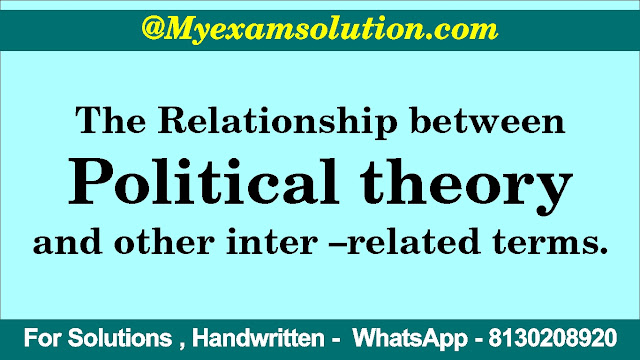Discuss the relationship between political theory and other inter –related terms.
Political theory and Political Science, both are
interrelated and supplementary to each other. However, some sort of confusion
prevails over their interrelationship. According to one view, political theory
is a generic term or major category which includes both Political Science and
political philosophy. The second view maintains that Political Science is
wider, which along with its scientific components, gives proper place both to
political philosophy and political theory. Most of the Indian and Asian
universities have adopted this view.
The third view believes in a value-free Political Science,
having no relation with unverifiable values or political theories. Most of the
radical behaviourists uphold this view. As regards their interrelationship,
Catlin maintains a broader perspective. According to him, political theory
involves common sense as well as value determination.
Political philosophy discusses justification of values,
motivation, direction, antagonism, change etc. He does not agree with
Morgenthau that Political Science incorporates political theory. According to
Catlin’s view, Political Science is related to means whereas political
philosophy concerns with ends, and, thus, both of them can be subsumed under
political theory. In any analysis of politics, means and ends can never be
separated from each other.
In this context, it is also very necessary to distinguish
between political thought and political theory. Political thought includes
political ideas and political thinking. Political theory in the modern sense is
not identical with political thought. Political thought is a very wide term
incorporating all forms of expressions pertaining to political entities,
including Political Science, theory, ideology, opinion, ideas etc.
Gettel, Doyle and several others belong to this school of
thought. James A. Gould and Vincent V. Thursby like to study subject matter of
Political Science in form of political thought. However, one cannot agree with
them. Political theory and political thought, despite their close relationship,
are different in nature, scope and validity. The latter is much more
subjective, speculative, abstract, transitory and ambiguous. Thoughts or ideas
pervade every institution, structure, process and ideology.
Political theory as such incorporates political ideas of specific
nature – empirical, communicable, valid and presented as a set of generalisations,
A very small part of political thought can be regarded as political theory.
Political theory is a long-term and painstaking enterprise, whereas, political
thought is more related to the world of amorphous type – kaleidoscopic,
imaginary, mystic, subjectivist and controversial. One should not equate
political thought with political theory.
Andrew Hacker is interested is studying ‘political theory’
only. According to him, a theory is ‘an essay in Political Science if it seems
to be the author’s intention to offer generalised descriptions or explanations
of the behaviour of men and political institutions.’ According of him, every
political theorist plays a double role, and is partly a scientist and partly a
philosopher.
Political theory, in both its old and new forms, should also
be separated from political philosophy. From older times, they have often been
identified as one and the same. Political philosophy is a part of, or
indirectly related to general philosophy, sometimes resting on the border lines
of metaphysics. Concepts of political philosophy are subjective, abstract,
mystic, general, and beyond empirical observation.
A philosopher, such as Plato, Rousseau or Hegel, reaches his
universal truths, axiomatic evidences or basic elements through speculation,
imagination, insight, or abstract reasoning. He looks at political phenomena
deductively on the basis of his unverifiable mental perspective, and asks the
common man and institutions to rise up to that level. His assumptions and
derivations are not necessarily testable or verifiable.
Modern political theory, on the contrary, is quite distinct
and related only to political reality, or objectivity which is worldly, sensory,
empirical and knowable. It can be checked, studied, tested or verified, through
standard methods, tools and techniques. By its very nature, it is explanatory,
inductive and fact-based. Values and ideals put forward by various political
philosophies are taken up by Modern Political Theory as propositions,
hypotheses and hunches for observation and testing.
Political theory is also different from political analysis.
The latter can be a part of the process of theory-making, political philosophy.
Political Science, interpretations etc, In analysis, one looks for consistency
of ideas, elements, factors or events, congruence with reality, coherence among
statements, reconciliation between purpose and result, and cause-effect
relationship. Analysis is a means, tool or instrumental activity to achieve a
broader goal like theory building.
Arnold Brecht stands for scientific political theory only. He points out that before the nineteenth century, philosophy, theory and science were used interchangeably. Still some such relationship is maintained. Theory attempts to explain phenomena in general and abstract terms. When scientific rules are followed, it becomes a scientific theory. But the latter is never a ‘law’ though it refers to some general ‘law’ or regularity. Law is rather a ‘fact’. Similarly, not all theory is necessarily scientific, and not everything scientific becomes theoretical.
Originally, philosophy was all-inclusive and coextensive with science, explaining everything – ideas about world, man, god, reality and truth. It is related both to is and ought, and is not limited or bound by the rules of scientific method. It goes beyond conditions and limitations of knowledge, logic and methodology. Now theory has moved towards science – its procedure, precision and control. Political theory, as such, stands in opposition to political philosophy, and accepts the latter, at the most, as its ‘working hypothesis’.







0 comments:
Note: Only a member of this blog may post a comment.